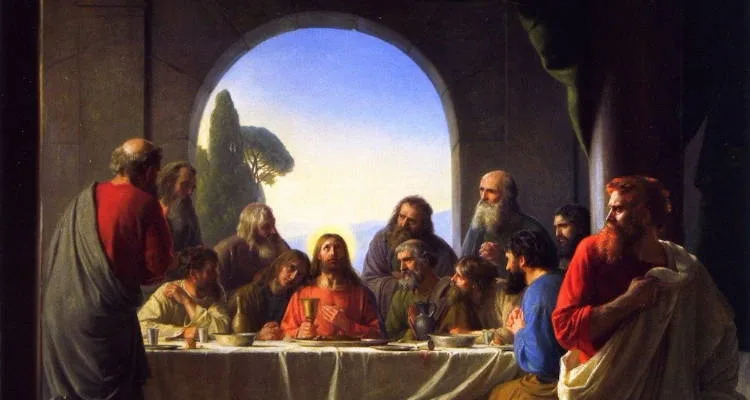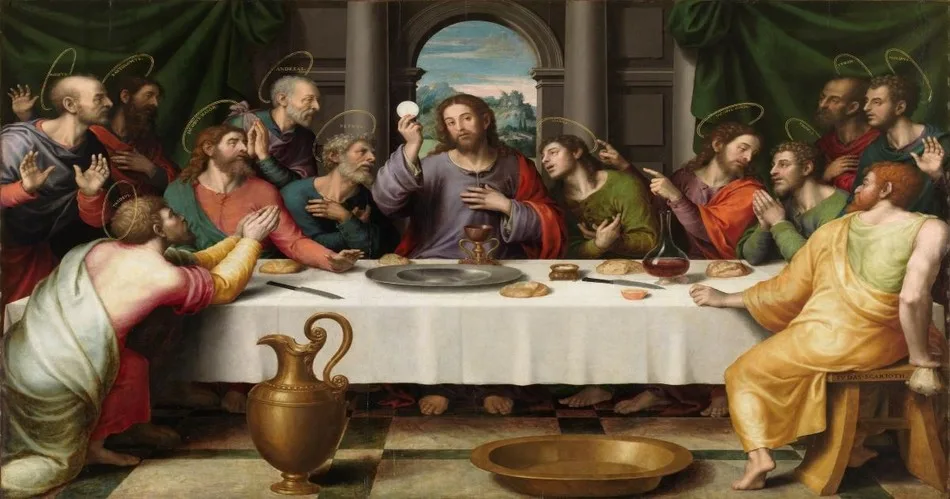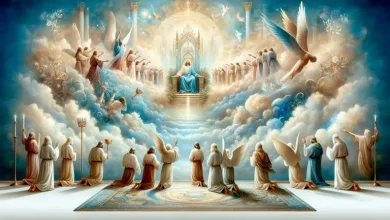What Is the Significance of the Lord’s Supper?
The second church ordinance all Christians practice is the Lord’s Supper, also known as the Lord’s Table, Communion, or the Eucharist, meaning “thanksgiving.” The model is the Passover meal, the Last Supper, as observed by Jesus and his disciples just before his arrest, trials, and crucifixion (Matthew 26:26–29; Mark 14:22–25; Luke 22:14–23; 1 Corinthians 11:23–26).
Jesus identified the bread with his body, which he offered as a sacrifice for sin (1 Peter 2:24), and the wine with his blood, which he shed for the forgiveness of sin (Ephesians 1:7). Elsewhere, Jesus is identified with the Passover event itself (1 Corinthians 5:7) and is called the Lamb of God (John 1:29, 36), whose blood cleanses and redeems (1 Peter 1:19).

Transubstantiation
As to the meaning of the Lord’s Supper, the Roman Catholic view is called transubstantiation: During the Mass, when the priest consecrates the bread, it actually becomes Christ’s physical body, and when he consecrates the wine, it actually becomes Christ’s physical blood. This is based on John 6, where Jesus said, “I am the bread of life” (v. 35) and “Whoever eats my flesh and drinks my blood has eternal life” (v. 54). This position sometimes is called “the actual presence” view because it holds that Jesus is actually and physically present in the bread and wine of the Mass.
The Protestant reformers said this would amount to a re-sacrificing of Jesus, whereas Hebrews says his sacrifice was a once-for-all-time event (10:10–14). Also, “I am the bread” was metaphorical speech, just as when he said, “I am the vine” (John 15:1, 5), “I am the light of the world” (John 8:12; 9:5), and “I am the gate for the sheep” (John 10:7). Clearly he did not intend to imply that he is a literal, physical vine, gate, or light. Alternative views began to emerge.
Consubstantiation
The Lutheran view is called consubstantiation (or the real-presence or mystical-presence view). After consecration, the bread remains bread and the wine remains wine; however, the real, physical body and blood of Jesus are, as the Lutheran confessions put it, present “in, with, and under” the bread and wine. The bread and wine are not the body and blood of Jesus, but they do contain his body and blood.
Think of how a sponge does not change into water when submerged but is thoroughly infused with the water. The bread and wine are not changed into body and blood, but the body and blood of Jesus permeate the bread and wine.
Other reformers raised a concern with this view. If Jesus ascended to heaven with his physical body, how could his physical body also be here on earth in any sense—whether through transubstantiation or consubstantiation? The physical human body can only be at one place at one time, and right now, the physical body of Jesus is in heaven.

Memorialism
Another model that emerged from the Reformation was the memorial view, originally argued by Ulrich Zwingli, a Swiss reformer. Memorialism focuses on the words of Jesus (Luke 22:19) and Paul (1 Corinthians 11:24–25) that the Lord’s Supper is to be done “in remembrance.” Paul adds that this event is a way of “proclaim[ing] the Lord’s death until he comes” (v. 26).
In Old Testament times, God often gave his people a sign to help them remember a covenant, for example, the rainbow for the Noahic covenant (Genesis 9:13–16) and circumcision for the Abrahamic covenant (Genesis 17:10–14). In the same way, the Lord’s Supper was to be the God-given sign by which believers remember their covenant, the new covenant, with him.
Jesus himself makes the connection between the supper and the new covenant (Luke 22:20). As such, the bread and wine neither become nor contain his physical body and blood; they are symbols that represent his body and blood, significant in that they remind participants of his sacrificial death and the covenant established as a result.
Those who hold the memorial view do not deny that Jesus is present during the celebration of the Lord’s Supper. His presence, though, is spiritual, not physical, and his presence is no different than at any other time or place, since he promised always to be with his followers (Matthew 28:20). In memorialism, then, the Lord’s Supper is an ordinance, not a sacrament, for it does not channel God’s grace in any unusual way.
Spiritual Presence
A final view held by many reformers is somewhere between the Lutheran and Zwinglian convictions. This is known as the reformed view (which is a bit broad, since Luther and Zwingli also were reformers) or more specifically, the spiritual presence view. According to this understanding, the bread and wine neither become nor contain Christ’s physical body and blood, but they do contain his spiritual body and blood.
When Jesus said the bread was his body and the cup was his blood, he did not mean it literally, but he did mean the bread and wine were more than mere symbols. He was saying that when his followers practiced the supper, he would be there in a very special way, “more than” his promised presence in all other situations. The Lord is present spiritually at the Lord’s Supper and at work spiritually through the eating of the bread and drinking of the wine. These, then, are means through which Christ conveys his grace to his followers, and the Lord’s Supper is thus considered a sacrament.
How to Practice the Lord’s Supper
Only those who have truly believed in Jesus and are trusting in him and him alone for their salvation should participate in the Lord’s Supper. This as a local church practice should (respectfully) exclude unbelievers attending on that particular day. And significantly, those who partake are to be “worthy” believers.
Paul addressed this serious matter due to abuses among the Corinthian believers (1 Corinthians 11:17ff.). Those who participate in an “unworthy manner will be guilty of sinning against the body and blood of the Lord” (v. 27). Christians “ought to examine themselves before they eat of the bread and drink from the cup” (v. 28); the idea seems to be that one must scrutinize and, if needed, correct his or her motives, attitude, and comprehension of the event’s significance. This is no empty ritual to be observed flippantly—we are to partake in reverence.
INTERESTING FACT
Those who uphold the sacramental aspect of the ordinances also believe there are other means by which God conveys his grace in a special way, such as through prayer and the preaching of his Word.
Aaron, D. (2012) Understanding Theology in 15 Minutes a Day. Minneapolis, MN: Bethany House Publishers, pp. 187–191.



